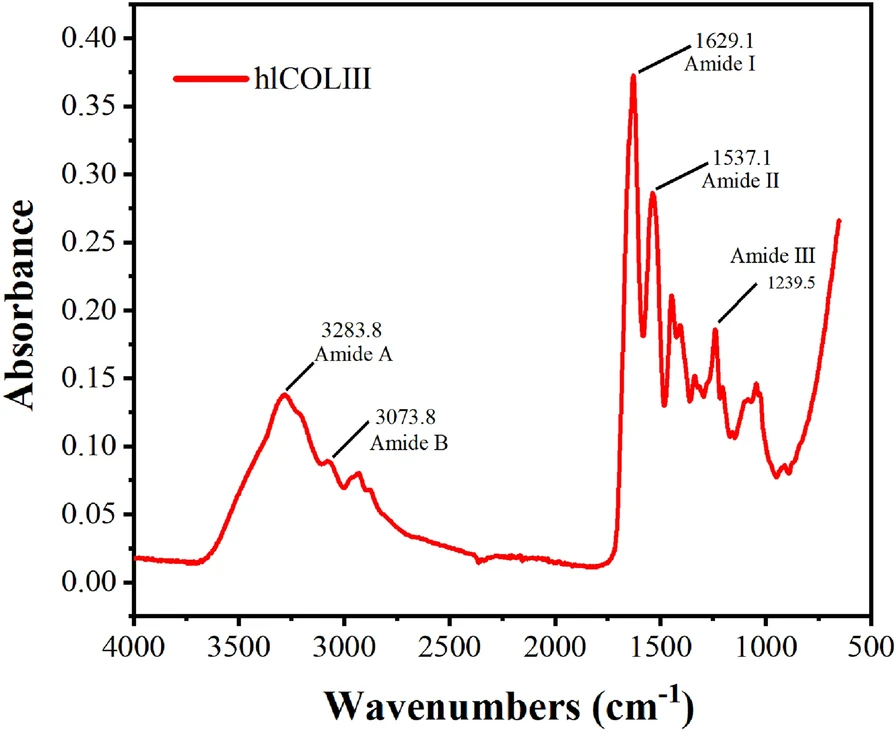Fourier Transform Infrared Spectroscopy Characterization Service | Recombinant Collagen
Fourier transform infrared spectroscopy characterization analysis is a technique designed to analyze the structural features of recombinant collagen molecules. It is primarily used to detect the vibrational modes of functional groups within the molecule, in order to determine key information such as secondary structure conformation, degree of crosslinking, and chemical composition. This method is based on the principle that different chemical bonds produce characteristic absorption peaks under infrared irradiation, and the signal is processed through Fourier transform to obtain high-resolution infrared spectra.
Fourier transform infrared spectroscopy characterization service based on recombinant collagen is widely applied in material research and quality assessment of recombinant collagen, especially in tissue engineering, biomedical materials, and cosmetic product development. It can be used to determine whether the collagen retains its native conformation, whether the crosslinking treatment is effective, and whether structural changes occur under different processing conditions, providing reliable support for formulation optimization, functional validation, and process control.

Xiang, Z X. et al. Bioresources and Bioprocessing, 2022.
Figure 1. FTIR Spectra of Recombinant Type III Human-like Collagen Displaying Absorption Peaks of Amide A, Amide B, and Amide I–III.
Services at MtoZ Biolabs
Based on a high-performance fourier transform infrared spectrometer (FTIR), the fourier transform infrared spectroscopy characterization service based on recombinant collagen launched by MtoZ Biolabs focuses on rapid and non-destructive analysis of the molecular structure and functional group features of collagen. This service can detect the composition of functional groups in collagen, evaluate its secondary structure components (such as α-helix, β-sheet, and random coil), and assess the degree of crosslinking. The service provides data including infrared absorption spectra, changes in characteristic peak positions and intensities, and proportions of structural conformations. It helps clients determine the structural integrity, conformational changes, and treatment effects of collagen, and is widely used in material evaluation, formulation optimization, and quality control research.
Analysis Workflow
1. Sample Receipt and Preparation
MtoZ Biolabs selects the appropriate sample preparation method based on the type of sample submitted by the client to ensure optimal spectral acquisition quality.
2. Infrared Spectrum Acquisition
A high-sensitivity Fourier transform infrared spectrometer (FTIR) is used to scan the sample and obtain its absorption spectrum in the mid-infrared region, reflecting the vibrational characteristics of functional groups within the molecule.
3. Data Processing and Spectrum Analysis
Professional software is used to perform background subtraction, smoothing, and peak extraction on the raw spectra. Key absorption peaks are analyzed for their position, intensity, and variation to identify features such as secondary structure composition and crosslinking status.
4. Result Delivery and Structural Interpretation
A complete infrared spectrum, structural conformation analysis, and expert interpretation are provided to help clients evaluate the structural integrity, stability, and conformational changes of recombinant collagen under different processing conditions.
Sample Submission Suggestions
1. Sample Type
Liquid, lyophilized powder, or gel forms of recombinant collagen are accepted. Samples should be free of strongly hygroscopic impurities or high salt concentrations to avoid interference with infrared absorption signals.
2. Storage and Transportation
Samples should be stored at low temperatures (–20°C or below) and protected from repeated freeze-thaw cycles. It is recommended to use ice packs or dry ice for cold-chain transportation to ensure structural stability.
3. Additional Information
Please indicate the sample origin, expression system, and whether the sample contains buffer components or additives, so that the appropriate sample preparation method can be selected and the analysis process optimized.
Service Advantages
1. Rapid and Non-Destructive
FTIR requires no complex pretreatment and enables non-destructive structural analysis within a short time, making it ideal for high-throughput screening and rapid quality assessment.
2. Comprehensive Information
Provides key insights into functional group composition, secondary structure proportions, and crosslinking variations of collagen, supporting multi-angle structural evaluation.
3. Sample Compatibility
Compatible with various sample forms including liquid, lyophilized powder, and gel; adaptable to different preparation methods such as pellet pressing, film coating, or ATR, offering strong flexibility.
4. Reliable Data
Backed by a high-sensitivity FTIR platform and an experienced structural analysis team to ensure data accuracy, reproducibility, and scientifically sound interpretation.
Applications
1. Structural Stability Evaluation
Fourier transform infrared spectroscopy characterization service based on recombinant collagen can be used to analyze structural changes of recombinant collagen under different temperatures, pH levels, or treatment conditions, assessing conformational stability and supporting storage condition optimization and stability studies.
2. Product Consistency Monitoring
By comparing infrared spectra of different collagen batches, this service helps determine structural consistency, ensuring quality control throughout the production process.
3. Crosslinking Effect Verification
Fourier transform infrared spectroscopy characterization service based on recombinant collagen can evaluate the impact of physical or chemical crosslinking on collagen molecular structure by monitoring changes in characteristic absorption peaks before and after treatment, validating crosslinking effectiveness.
4. Expression System Comparison
By analyzing structural differences in recombinant collagen produced from various expression systems (e.g., E. coli, mammalian cells), this service supports selection of optimal systems and aids in process development.
FAQ
Q1: Will the Sample Be Damaged during the Analysis?
A1: FTIR is a non-destructive analytical technique. Especially under the ATR mode, no chemical treatment is required, and the sample can retain its original state, making it suitable for structural analysis of valuable samples.
Q2: Are the Test Results Reproducible?
A2: Yes, the results have good reproducibility. We use a highly stable FTIR platform, combined with standardized sample preparation procedures and professional technicians, to ensure consistency and comparability of spectral data, making it suitable for batch-to-batch consistency comparison.
Q3: Do you Provide Spectrum Interpretation and Technical Support?
A3: Yes. Each report includes raw spectral data, annotations of characteristic peaks, and interpretation of structural changes. Technical consultation can be provided based on client needs to assist in structural assessment and process optimization.
Deliverables
1. Comprehensive Experimental Details
2. Materials, Instruments, and Methods
3. Data Analysis, Preprocessing, and Estimation
4. Bioinformatics Analysis
5. Raw Data Files
How to order?







